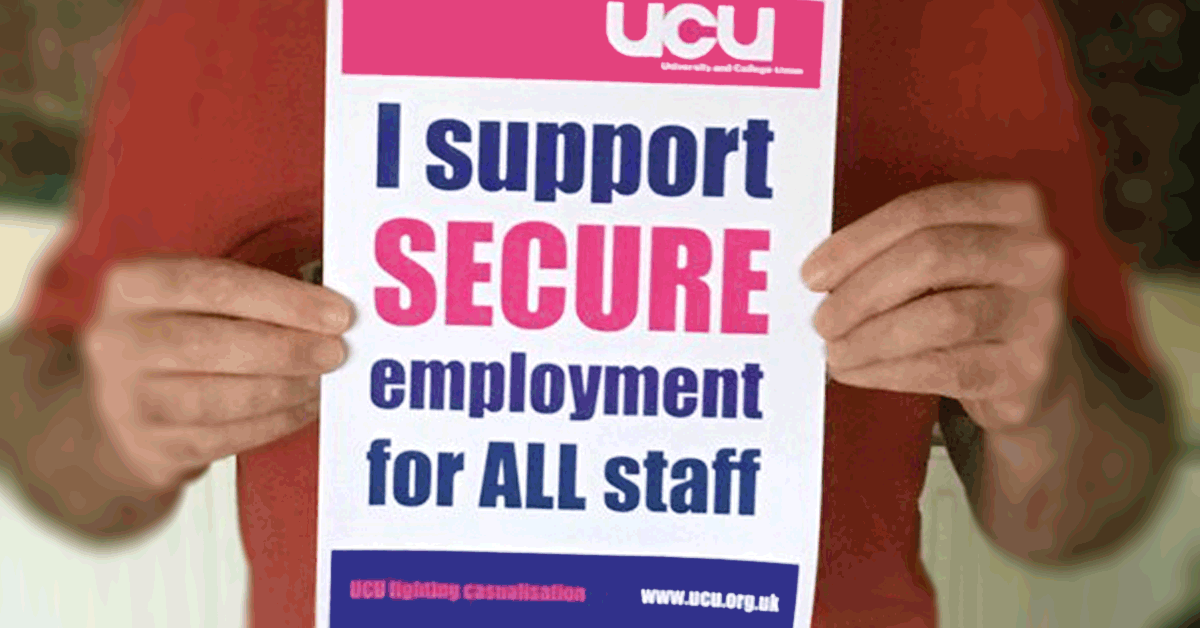UCU members to defend most vulnerable staff as universities refuse to come clean on job cut plans
27 July 2020
Members of UCU are being urged to support their most vulnerable colleagues and put pressure on their universities as the union launches action to support casualised staff.
The union is urging its members to sign up to 10 pledges* to defend their colleagues on insecure and fixed-term contracts who are facing an uncertain future. With just weeks to go until the start of the new academic year, only a handful of universities have set out concrete plans for insecure staff.
At King's College London over a thousand fixed-term staff have been told their contracts are under review. At the University of Liverpool more than 600 face the sack, at Goldsmiths the number is around 400 and close to 300 at Essex.
That means 2,280 jobs are likely to go at just four institutions that the union has been told about. UCU said if this picture was repeated across the sector then almost 30,000 fixed-term contracts would be at risk.
UCU fears universities will refuse to renew the contracts of thousands of fixed-term staff, which will impact on the student experience and leave colleagues left behind to pick up the slack. The few universities who have set out their plans are getting rid of thousands of casual staff, who are disproportionately likely to be women and from black and minority ethnic (BAME) backgrounds.
One third of all academics working in academia are employed on fixed-term contracts. This figure rises to almost half for teaching-only academics (49%) and over two thirds (67%) for research-only staff. BAME academic staff are more likely to be employed on a fixed-term contract with over two-fifths (42%) on a fixed-term contract, compared to less than a third (31%) of white academic staff.
The union said universities rely on an army of insecure workers who have no more rights than other members of the gig economy and could be let go with no warning and little prospect of finding alternative work.
The pledges include putting pressure on local MPs to urge the government to step in with a support package for universities that will guarantee their lost income and save jobs. They also commit UCU members to put pressure on their university by highlighting the inequality of cutting casual staff and the impact it will have on the workloads of other staff.
UCU general secretary Jo Grady said: 'Students would be stunned to learn how much of their teaching is done by staff who have no real security and don't even know if they'll have a job this year. Universities rely on an army of insecure staff who have no more rights than other members of the gig economy.
'Universities have made promises that they will be delivering high-quality teaching both online and face-to-face in the autumn. You cannot deliver that by sacking thousands of people. With just weeks until the start of the new academic year, universities still are not coming clean about their plans and what they will mean for the tens of thousands of staff on insecure contracts and with an uncertain future.
'Universities are cutting budgets for casual staff and refusing to renew fixed-term contracts, when they should be extending them for the whole duration of this crisis. We can't trust our senior managers to look out for our most vulnerable colleagues, so we have to take their security into our own hands.
'These ten steps range from simple actions to more sustained, organised and visible forms of support. Some of them can be done with the support of UCU branches or head office; others we can do on our own or by getting organised with colleagues. Many of them can be done even if you're not a UCU member yourself.'
* The pledges:
- Share your pledge to take these ten steps. We want thousands of other UCU members to stand up and say, publicly, that they have their colleagues' backs - no matter what kind of work they do or what kind of contract they are on.
- Watch and share UCU's video on casualisation. UCU has created a video using interviews with UCU members in all our sectors, on all kinds of contract. They talk about the scale of the problem of job insecurity and how it fits in with broader changes in post-16 education over the last decade and in the wake of the coronavirus pandemic.
- Write to your MP about the need for the government to step in and guarantee funding for post-16 education, to secure all jobs in the sector. UCU has updated its template letter to MPs to reflect the latest information on job cuts. Thousands of UCU members have already written but we need more to help us really emphasise the scale of the attack on our colleagues and put our sectors at the top of the government's agenda.
- Change your email signature to advertise these ten steps and encourage your colleagues to take action. This is an easy but very helpful way to create noise and momentum for our campaign. Here is a template.
- Support anti-precarity campaigns on social media. UCU has created public lists of Twitter accounts for UCU branches and for anti-precarity campaigns - and you don't even need a Twitter account to keep up. Follow UCU's Facebook page and instagram account, which will continue to highlight these campaigns. And have a look at the #PrecarityStories hashtag on Twitter.
- Get involved with your branch. Any branch in an institution making significant cuts to precarious staff will be campaigning on this issue on top of their normal workload and they will need any help they can get. There might be an anti-precarity working group you can join; there might be vacancies for committee posts; there might be a need for another UCU rep in your department. Pitch in wherever you can to build capacity in your branch.
- Get involved with UCU's national campaign. As part of the Fund The Future campaign UCU is putting on a series of online events involving UCU staff and members. These will provide a space for different parts of the union to come together, learn from each other and discuss how the crisis is changing post-16 education and what we can do to place it on a secure footing. Have a look at the programme, in particular the event on protecting casualised staff, register your interest for upcoming events, and watch recordings of past ones on our YouTube channel. Have a look at the resources section of UCU's campaign website.
- Grow the union. Every member we gain increases our power in the workplace and our ability to negotiate to defend jobs and improve working conditions for all staff. The more we grow, the louder our voice and the harder it gets for employers to ignore it. Click here to find out about UCU's generous terms for precariously employed members. These terms are linked to in the email signature provided in Step 4, but there's nothing to stop you being a more proactive recruiter. Set yourself a target of talking to one precariously employed colleague who isn't currently a member and convincing them to join.
- Get together with colleagues in your department, whether or not they are UCU members, to discuss and quantify the impact of cuts to precariously employed staff on your workload. How will you cope without the staff who do so much of the department's teaching and research? Which modules will it affect? How will it change your research activities? Will the remaining staff be instructed to take on extra administrative duties? Start a shared spreadsheet, set up an informal working group and feed whatever information you can to your UCU branch. Look at this open letter by colleagues in one department at Sheffield University for an example of how to raise this and other issues in your institution.
- Join forces with colleagues in your department or institution to write a collective letter expressing your concerns about the equality impact of cuts to precariously employed staff. UCU's research shows that women and BAME staff are disproportionately affected by casualisation, and we need to highlight that inequality wherever cuts to casual contracts are taking place. The appropriate route for this will depend on your sector or institution: for example, you could write to your department's Athena SWAN rep, your institution's EDI lead, or both. Make sure you copy your letter to your UCU branch. This article by Goldsmiths UCU is a good example of how to do this kind of work.
- PrintPrint this page
- Share



